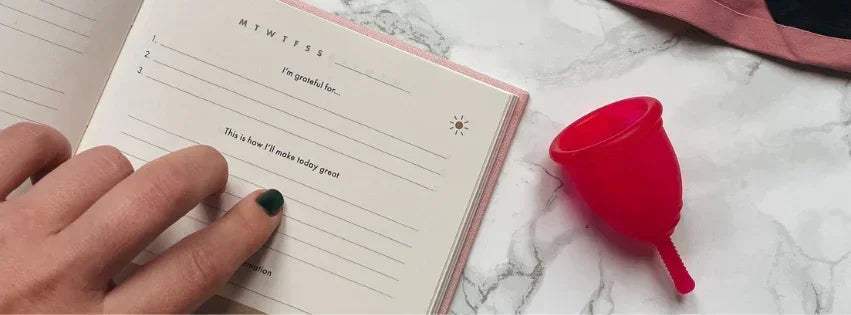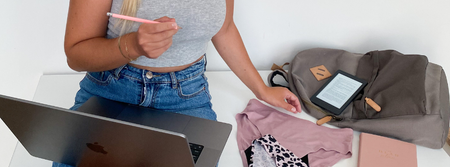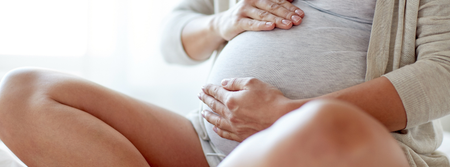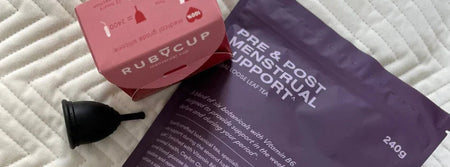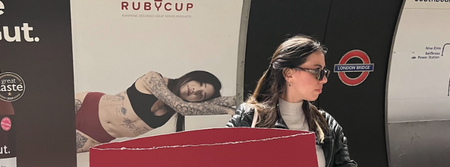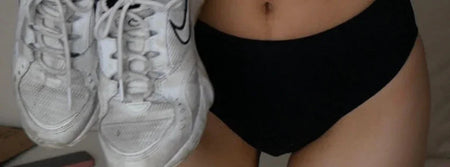People with a uterus will spend an average of ten years of their lives menstruating. Some of us welcome our periods as a monthly check-in on our body’s health and our pregnancy status. But, depending on your life and schedule, your period may not always be welcome. One of the most frequent questions our loyal Ruby Cup users often ask is, “How can I make my period end faster?” We, as champions of the fuss-free period, are all for trying to find some hacks to shorten periods. Turns out your body has your cycle length pretty well dialed in, but there are a few tricks to try.
What is a normal period length?
A normal period length is considered to range between 2-7 days according to the American College of Obstetricians and Gynecologists (ACOG). The length of your period is determined by how long it takes your body to get rid of all of the menstrual tissue that has built up over the first part of your cycle. Each month, your body prepares for an embryo to implant, or for pregnancy to occur by thickening and growing your endometrium (the inner tissue lining of your uterus).
Rising and falling levels of two hormones, estrogen and progesterone, determine the lining’s thickness or thinness at any given point in your cycle. The thicker that lining is, the heavier your flow and the longer it may take to shed.
If you do not become pregnant after ovulation, estrogen and progesterone levels drop rapidly. This drop sends a signal to your uterus to shed your endometrium. Your period starts as the mixture of blood, secretions from your cervix and vagina, and pieces of the endometrium leave are squeezed out by your uterus (a.k.a cramps), through your cervix, and out of your body through your vagina.
The two main ways to make your period end faster
So, now that you made it through the biology lesson, you’ve arrived at the main points of this post. The two approaches to shortening your period are to:
- Decrease the thickness of your endometrial lining
- Increase the speed at which your menstrual flow leaves your body
The reality is that your body has this period-thing down – you will have about 500 periods in your lifetime, after all. You can try tinkering with your cycle length, but truth be told, there is no easy DIY hack to change the main factors determining how long your periods last.
What factors influence how long your period lasts
It may take our bodies a couple of years after our first period to develop a regular, predictable menstrual cycle. Once-established, your cycle length remains pretty constant. The drivers of your cycle length are:
- Whether or not you are using any hormonal birth control
- Your body mass index (BMI) or body composition (amount of body fat)
- Your age
- Your physical activity level
- Your diet and nutrition
A note here about body weight, body size, BMI, and periods. It is true that people who have larger bodies and more body fat have heavier periods. This is because the fat cells in your body can make estrogen. Estrogen stimulates the growth of your uterine lining. So, the more fat cells a person has in their body, the more estrogen they have in their blood, the thicker the endometrium they grow each month, and the heavier or longer their periods.
It is not true, however, that if a person who menstruates loses weight, their periods will automatically shorten or become lighter. In fact, if a person severely restricts their food intake or begins an extremely-intense exercise regime, they stop having periods altogether (called amenorrhea).
Talk with a doctor, midwife, nutritionist, and even an exercise trainer to learn more about what might be the ideal weight, diet, and exercise routine to optimize your menstrual health. While losing some weight might shorten your period slightly, starting a crash diet or signing up for a marathon is not a quick, easy, or guaranteed way to spend fewer days menstruating.
How to thin your endometrial lining
Dieting and regular exercise can be hard habits to stick with. Good thing there are much easier, quicker, and more effective ways to try to shorten your period than changing your diet or activity level.
The most common (and most effective) approach many people take is to add in some additional hormones, usually in the form of hormonal birth control. Methods such as birth control pills, hormonal IUDs, the contraceptive implant, the birth control shot, patch, and ring all reduce the thickness of your endometrial lining.
One out of every five women with a progesterone IUD (Skyla, Kyleena, Mirena, or Liletta in the U.S.) will stop having periods altogether within the first six months to one year. Other women choose to take only the active birth control pills and skip the placebo weeks when they would normally have a period. Even without skipping the placebo week, people taking birth control pills have lighter and shorter periods. Remember that none of these hormonal changes from birth control are permanent – within 1-2 cycles of stopping most hormonal contraceptive methods, people will return to their normal flow and cycle length.

Other people with heavy-flow periods choose to avoid hormones and try more natural approaches. The bright yellow spice turmeric has been shown in laboratory studies to reduce estrogen’s impact on the growth of the cells in your endometrial lining. You won’t get enough of turmeric's flow-stopping power by loading up on curries though – look for turmeric capsules at the health foods store or make your own turmeric tea for extra inflammatory health benefits. For the best results, try drinking turmeric tea three times a day during your menses. If you like the way it tastes, you might try a cup of tea once a day all month to try to thin your lining over the course of your menstrual cycle. For optimal effect, combine your turmeric intake with black pepper which enhances curcumin absorption in the body.
Social media, clean living, and holistic nutritional websites overflow with suggestions for particular foods, supplements, or herbal remedies that claim to make your period end faster. Unfortunately, more intensive scientific studies either have not been done (periods are not traditionally a popular research area) or are inconclusive. Some of the more frequently recommended (but whose safety or efficacy are not proven) foods or supplements to try are:
- Pineapple
- Red Raspberry Leaf (as a tea)
- Ginger capsules
- Myrtle fruit syrup
- Vitamin B6 200-800 mg a day (shown to lower estrogen and increase progesterone)
Always make sure to talk with your healthcare provider when thinking about starting any regular dietary supplement or herbal remedy to try to make your period end faster.
How to increase the speed of your menstrual flow
So if the options for trying to thin your endometrial lining don’t seem that attractive, remember your second plan of attack can be to try to speed up how fast your menstrual flow leaves your body.
Besides helping you stay at a healthy body weight, exercise during your period can also jump-start your flow. Use gravity and motion to your advantage – the more jumping, running, and other cardio workouts you take on, the more menstrual flow will leave your body. Plus, exercise has the added benefits of releasing feel-good endorphins, reducing bloating, and helping to relieve menstrual cramps.
Just remember to stop or slow down if you feel sick, tired, dizzy, or have any pain – you don’t have to set any PRs while menstruating. Also, while yoga during your period can be a great way to relieve menstrual mood changes, avoid any upside down (inversions) or poses like handstands if you have your period. While not scientifically proven, some health care experts believe that tipping your uterus up towards your head during menstruation could do more harm than good.
Menstrual cups can be a comfortable and leak-proof option for athletes and those of us wanting to wear cute workout tights without having to worry about leaks. Check out Ruby Cup’s recommendations for the best menstrual cups for athletes and sports enthusiasts.
Whether you are signing up for period work-outs or not, staying on top of how much water you are drinking is another hack for shortening your period. Remember you learned earlier that your menstrual flow is composed of blood as well as other secretions? Well, the liquid portion of blood is about 90 percent water.
If you are dehydrated, your blood will be thicker and less likely to flow out of your body, meaning more days with your period. Make sure to get at least 64 ounces of water each day (about 8 medium-sized glasses or 4 water bottles full). You will need more water if you drink caffeinated beverages like coffee, or alcohol, if you exercise, or live in a hot climate. Dehydration (not having enough water in your body) also makes period cramps, bloating, headaches, and fatigue (feeling tired) worse when you have your period, so it is definitely something to try to avoid.

And the last, but definitely the most fun, way to try to make your period end faster is to have sex and orgasms. Whether through sex or masturbation, when you orgasm, your uterus contracts. These contractions not only reduce painful cramps, but also help squeeze out your menstrual flow more quickly.
While you can’t have penetrative intercourse while wearing your Ruby Cup, menstrual cups are a great way to keep the sheets and your partner clean if you are orgasming through other kinds of sexual play during your period. Some people also suggest that having penetrative vaginal sex on your heavy days can help more of your menstrual flow leave your body – shower sex might be a good option if you want to save your white sheets!

How to monitor your period length and flow
As many of us know, even the slightest change in diet, stress, or health can throw your period off track. If you go to the doctor because you have such a change, one of the first questions any healthcare professional will ask is how your period length or flow have changed.
The benefit of using a menstrual cup is that you can keep track of exactly how much you are bleeding – you know how often you have to change your cup and you can even measure your menstrual flow with the conveniently marked milliliters on the Ruby Cup. This is not possible with the cotton and rayon in pads and tampons because they absorb all the blood.
Another benefit of using a period cup over a disposable menstrual product is the ability to see your blood and look for blood clots. Blood is designed to form clots anytime it stops flowing, so you may notice more clots in your menstrual cup when you empty it than you are used to seeing on your pad or tampon.
Clots by themselves do not mean something is wrong with you – in fact, they show that your body is working well to keep you from losing too much blood. If you pass multiple clots larger than the size of a quarter for several hours in a row, you might want to make an appointment with your healthcare provider just to check in and make sure your flow is not too heavy.
Yet another benefit of using a menstrual cup is that when inserted to the correct location, high up in your vaginal just below your cervix, you can catch the blood and any clots earlier. You can remove your menstrual flow when you remove your cup – no more waiting days for gravity to bring those last few drops out to unexpectedly stain your underwear.
When to worry about your menstrual flow
How long your period lasts or the amount of your flow can change over the course of your lifetime. Most of the time these changes are nothing to worry about, but you might want to check in with your gyno if you notice any of the following:
- Flow so heavy that you are changing a tampon or pad every hour, for several hours at a time, or having to change your large menstrual cup much frequently.
- Bleeding for longer than 8 days every menstrual cycle
- Having heavy periods and noticing signs of iron deficiency anemia (dizziness, feeling tired, weak, and cold)
- Bleeding or spotting irregularly, in between your periods
- Bleeding after sex, especially if sex is also painful
- Skipping periods and having longer cycles (more than 38 days from the start of one period to the start of your next period)
It is normal to have some change cycle to cycle and also over time as you age in the amount of flow and how long your period lasts. There are, however, several health conditions like PCOS, endometriosis, fibroids, pelvic inflammatory disease (PID), and blood clotting disorders that can cause heavy, long periods. Talk with a healthcare provider about whether or not they think you should be tested for any of the conditions. Your menstrual health is an important part of your overall well-being. Use a menstrual cup to help you stay on top of what is normal for your body.
At Ruby Cup, we want to make your menses as fuss-free as possible, even if you have a heavy flow. Learning a little bit more about the how’s and why’s of your menstrual cycle each month can help you not only be prepared for your period each month, but also feel a bit more in control. As an easy-to-use, zero-waste option for today’s people with periods, Ruby Cup offers a great way for you to learn to live with your period (and maybe even make it end faster) rather than dread its arrival each month.
FAQ’s
Do menstrual cups affect how heavy your periods are?
No. Ruby Cup is made from 100 percent medical-grade silicone. There are no hormones or other biologically-active chemicals in Ruby Cup that are absorbed into your body or change your body’s natural hormonal cycles.
Some people might worry that their periods are heavier after switching to a menstrual cup. Because you can actually see your menstrual flow and how much there is when using a menstrual cup, the actual amount of your menstrual flow may seem more than you expected. This is also because disposable tampons and pads are designed to be highly absorptive, so it is hard to actually tell how much blood they have sucked up.
Do period cups make your periods last longer?
No. Actually, period cups like Ruby Cup, when inserted high enough in your vagina to the right location (see our guide on where a menstrual cup should sit), do a better job of catching all of your menstrual flow and getting it out of your body faster than pads. When you remove your menstrual cup, you remove all of your flow neatly, easily, and much more quickly. No more waiting for the last bits of your old period blood to make its way out of your vagina and out onto your menstrual pad.
How do you know if you have a heavy menstrual flow?
It is estimated that almost one out of every five women has had to miss a day of school, work, or an important event because of their period. If your flow is so heavy that you are missing out on life, then it is too heavy. Simple as that. It is normal however to have heavier bleeding on days 2-3 of your cycle, followed by lighter flow days.
Consider checking in with a healthcare provider about your monthly flood if: 1) you have signs and symptoms of anemia (low iron) or 2) you have to put your life on hold each month because you are afraid of period accidents.
You might want to try some of our tricks to try to make your period end faster, or at the very least, switch to a menstrual cup so that you can start measuring your menstrual flow. Ruy Cup reviewed the seven best menstrual cups for heavy flow, and our pick is the medium-sized Ruby Cup which should allow you to go at least eight hours without worrying about leaks.
Is it safe to make your period shorter or end faster?
It depends on how you try to make your period shorter or end faster. For most healthy, young (younger than 50 years old) menstruating people, using hormonal birth control is a safe and effective way to shorten their cycles or lighten their flow.
The other strategies or hacks suggested here are also safe for most people who menstruate who are otherwise healthy. You just might not see dramatic enough results to justify the effort it took to brew your own turmeric ginger tea three times a day for example. Trying to restrict your food intake or start an intense exercise plan in order to lose weight with the end goal of making your period shorter is not safe.
Written by Amy Harris.
Amy Harris is a certified nurse-midwife with more than a decade of clinical experience in reproductive health clinics, hospitals, and private OB/GYN practices. Amy holds a Masters of Science in Maternal and Child Health from Harvard School of Public Health and completed her nursing and midwifery training at Yale School of Nursing and Boston University School of Public Health. Passionate about empowering women through health education, Amy puts her public health training to work as a dedicated women’s health writer.


